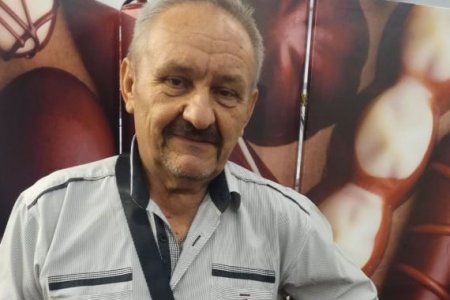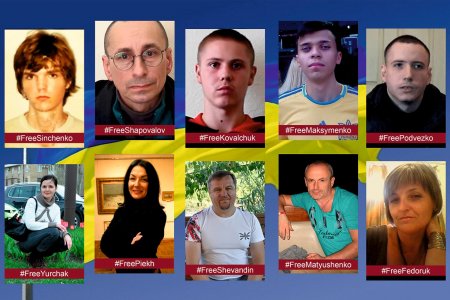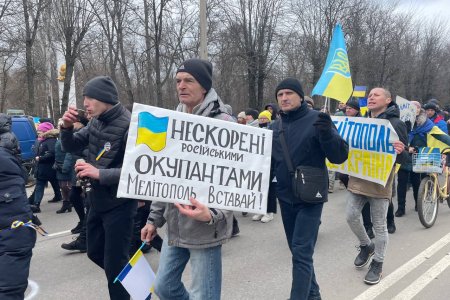
Over six months after Andriy Kolomiyets served a politically motivated 10-year sentence to the last day, the Ukrainian remains unable to get out of Russia. He has, at least, left the deportation centre where he had been held since January 2025, but is now trapped at the border between North Ossetia in Russia and Georgia, with it unclear when, or if, he will be able to cross into Georgia and return to Ukraine.
Kolomiyets’ wife, Galina, reported on 8 July that her husband has been stuck “in a basement in Verkhniy Lars, in North Ossetia on the border with Georgia for a second full day. The conditions are terrible, with people having to take turns sleeping, as there aren’t enough places. There is no water or food, she writes, nor medical care, and they are all cramped together, including people suffering from tuberculosis.
The Crimean Human Rights Group [CHR] has learned that Kolomiyets was interrogated by Russia’s FSB for several hours and is currently waiting at the checkpoint at Verkhniy Lars for he necessary documents to be able to cross the border. He is stranded there, together with a few dozen other people.
There is some hope in that Kolomiyets is no longer effectively imprisoned in the Krasnodar krai deportation unit, however the situation is difficult as his passport expired while he was held prisoner in Russia. In May 2025, CHR Head Olha Skrypnyk reported that Kolomiyets had first been found ‘guilty’ of infringing migration legislation and remanded in custody for 90 days, then, on 14 April, this was extended for a further three months. Skrypnyk stressed that this was despite the fact that Russia had already, several years ago, declared Kolomiyets persona non grata in the country, and he was supposed to be simply deported.
He was held then with several dozen Ukrainian citizens, including people who had served sentences to the end in Russia and who were also due to be deported. In January 2005, soon after his ‘release’ from the prison colony and imprisonment in the deportation unit, Kolomiyets told Galina that he was held with two young men from Kherson oblast, one of whom had been held there for a year and a half, the other for two and a half years. Although there is a real problem, namely the lack of any diplomatic relations between Ukraine and Russia since the latter’s full-scale invasion in 2022, there had been rumours that this was yet another ploy. It was feared that the intolerable conditions and the lack of any prospect of resolution were being used to try to force men into agreeing to fight against Ukraine. If that was the plan, however, there is nothing to suggest that it has worked.
Russia did, however, resort to another ruse in late May, during the first major exchange of prisoners, agreed in Istanbul. Russia released 880 Ukrainian prisoners of war and was due to make up the 1,000 prisoners on either side by freeing 120 civilians. Given the number of Crimean Tatar and other Ukrainian political prisoners whom Russia is illegally holding, as well as the thousands of civilians abducted from occupied territory, both before and after the full-scale invasion, there was every reason to hope that Russia would, at very least, free political prisoners / hostages, like gravely ill Crimean Tatar civic journalist Amet Suleimanov, Vitaliy Atamanchuk and others whose lives are in immediate danger, Russia released only one political prisoner, Pavlo Zozuliuk, from occupied Kakhovka (Kherson oblast), a relatively young man in good health, whose sentence was, in any case, about to end.
It returned 119 former or current convicted prisoners, although they were, in any case, due to be deporting these people. Fifteen had been convicted of crimes in Ukraine prior to Russia’s full-scale invasion of Ukraine and had been illegally taken to Russia from prison colonies in occupied Kherson oblast. It is likely that all had resisted heavy Russian pressure and refused to take Russian citizenship. According to Hanna Skrypka from “Support for Ukraine’s Prisoners’, the 15 prisoners included three men whose sentences had not ended, and who would serve them to the end in Ukraine. The other 104 civilians released were Ukrainians who had been serving sentences in Russian prisons for crimes committed in Russia and, following their sentences, had also ended up in detention centres.
While they too were stranded, due to the current situation, this was clearly against the agreed principles of the prisoner exchange. Even here, Russia could have, yet chose not to, include recognized political prisoners like Andriy Kolomiyets.
Kolomiyets is one of two Ukrainian political prisoners, sentenced by kangaroo courts in occupied Crimea over alleged, and entirely unprovable, actions during the Euromaidan protests in Kyiv before Russia’s invasion of Crimea. As reported earlier, three of Russia’s first Ukrainian political prisoners – Valentyn Vyhivsky; Oleksandr Kostenko and Andriy Kolomiyets were probably targeted in Russia’s revenge for Euromaidan, which had first torpedoed Moscow’s attempts to gain political control over Ukraine without openly invading. If all three men, and a significant percentage of all Russia’s Ukrainian political prisoners, faced horrific levels of torture, the charges against Kostenko and Kolomiyets stood out because of their extraordinary legal nihilism.
Kolomiyets, who is from Kyiv oblast, was just 22 when arrested on 15 May 2015 in the Northern Caucuses of Russia where he was living with his partner (now wife) Galina and her four children. The first thing that the officers said to Galina before taking Andriy away was that the young Ukrainian was a Maidan activist. Although the officers made two different, but equally absurd, attempts to justify Kolomiyets’ detention by claiming to have ‘found’ a small amount of hashish, it was clear from the outset that this was a pretext. The real, if entirely surreal, plan was to charge Kolomiyets with a nonsensically implausible ‘offence’ linked with Euromaidan.
Kolomiyets was taken to occupied Crimea where he was accused of having thrown a Molotov cocktail at two Berkut officers from Crimea, then helping the regime of Viktor Yanukovych to try to crush the protests. The alleged Molotov cocktail was supposed to have “caused them pain”, although neither Berkut officer had sought medical treatment nor had the supposed ‘attack’ ever been reported. These two individuals, who had since betrayed their oath of allegiance to Ukraine, appeared at the occupation ‘court’ and claimed to remember Kolomiyets. The Kremlin-installed ‘prosecutor’ and ‘judges’ were undeterred by the lack of any documented evidence for such an incident, which would, in any case, have involved only Ukrainian citizens on Ukrainian territory and subject to Ukrainian law. Instead, the prosecutor claimed, and a Russian-controlled ‘court’ in Simferopol accepted, that this alleged attack came under Article 30 § 3 and 105 § 2 of the Russian criminal code, namely “attempted murder of 2 or more people in connection with their official activities … out of motives of political and ideological hatred”.
Kolomiyets, who had been in custody since May 2015, was sentenced to 10 years’ imprisonment: six years for the alleged ‘attack’ on the two ex-Berkut turncoats (Article 105 of the Russian criminal code), and four for the supposed possession of hashish (Article 228). The sentence was upheld on October 27 by the occupation ‘Crimean high court’ under ‘judge’ Halyna Redko who had already taken part in at least one other politically motivated trial since betraying her oath to Ukraine.
Memorial (then still the Memorial Human Rights Centre) took little time in declaring Kolomiyets a political prisoner. It demolished the narcotics charges against the young man, while stating simply that the main indictment was grotesque since a court under Russian legislation could have no jurisdiction over events allegedly taking place between Ukrainian nationals in Ukraine. It also pointed to Kolomiyets’ own account of the savage torture to which he was subjected.



